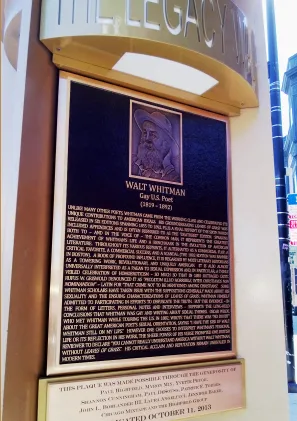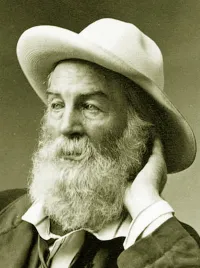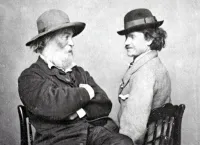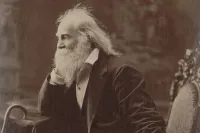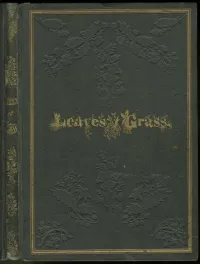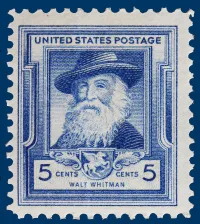Plaque Sponsor
Paul Highfield, Myron Mix, Yvette Pryor, Shannon Cunningham, Paul DeSousa, Patrick F. Torres, John L. Bohlander III. Laura Angelucci, Jennifer Baker, Chicago Mixtape and The Highfield GroupBiography
1819 - 1892
"Be curious, not judgmental."
- Walt Whitman
Unlike many other poets, Whitman came from the working class and celebrated its unique contributions to American ideals. His groundbreaking Leaves of Grass was released in eight complete editions spanning 1855 to 1892. Speaking both to, and in the voice of, the common man, it represents the greatest achievement of Whitman’s life and a benchmark in the evolution of American literature. Throughout its various reprints it alternated as a commercial flop, a critical favorite, a commercial success, and a scandal. (The 1882 edition was banned in Boston). A tome of profound influence, it is regarded by most literary historians as a towering work, commanding, and uniquely American. It is also almost universally interpreted as a paean to sexual expression and, in particular, a thinly veiled celebration of homoeroticism – so much so that one outraged critic denounced it for “that crime not to be mentioned among Christians.” Though a number of Whitman scholars have taken issue with the suppositions generally made about his sexuality and the ensuing characterizations of Leaves of Grass (aided by a bit of obfuscation to which Whitman himself admitted) the evidence – in the form of letters, personal notes and interviews – supports the contention that Whitman was gay and writing about sexual themes. Oscar Wilde, who met Whitman in America in 1882, wrote that there was "no doubt" about the great American poet's sexual orientation saying "I have the kiss of Walt Whitman still on my lips." Regardless of his personal life, the sheer power of his verse prompted one British reviewer to declare "You cannot really understand America without Walt Whitman, without Leaves of Grass.” Dubbed the first “Poet of Democracy” Whitman’s critical acclaim and reputation remain unrivaled in modern times.
1819 - 1892
"Be curious, not judgmental."
- Walt Whitman
Unlike many other poets, Whitman came from the working class and celebrated its unique contributions to American ideals. His groundbreaking Leaves of Grass was released in eight complete editions spanning 1855 to 1892. Speaking both to, and in the voice of, the common man, it represents the greatest achievement of Whitman’s life and a benchmark in the evolution of American literature. Throughout its various reprints it alternated as a commercial flop, a critical favorite, a commercial success, and a scandal. (The 1882 edition was banned in Boston). A tome of profound influence, it is regarded by most literary historians as a towering work, commanding, and uniquely American. It is also almost universally interpreted as a paean to sexual expression and, in particular, a thinly veiled celebration of homoeroticism – so much so that one outraged critic denounced it for “that crime not to be mentioned among Christians.” Though a number of Whitman scholars have taken issue with the suppositions generally made about his sexuality and the ensuing characterizations of Leaves of Grass (aided by a bit of obfuscation to which Whitman himself admitted) the evidence – in the form of letters, personal notes and interviews – supports the contention that Whitman was gay and writing about sexual themes. Oscar Wilde, who met Whitman in America in 1882, wrote that there was "no doubt" about the great American poet's sexual orientation saying "I have the kiss of Walt Whitman still on my lips." Regardless of his personal life, the sheer power of his verse prompted one British reviewer to declare "You cannot really understand America without Walt Whitman, without Leaves of Grass.” Dubbed the first “Poet of Democracy” Whitman’s critical acclaim and reputation remain unrivaled in modern times.
Lesson Plan
Please login or register for an account to view this lesson plan.
Demography
Demography
Gender Male
Sexual Orientation Gay
Gender Identity Cisgender
Ethnicity Caucasian/White
Faith Construct Agnostic
Nations Affiliated United States
Era/Epoch Civil War (1861-1865) Gilded Age (1865-1900) Victorian Era (1837-1901)
Field(s) of Contribution
Advocacy & Activism
Art, Music, Literature & Theater
Author
Editor
Journalism
Media & Communications
Poet
Politics
Social Justice
Social Sciences
US History
Commemorations & Honors
Posthumous Hall of Fame for Great Americans Inductee (1930)
U.S. Postal Service Famous Americans Series Commemorative Stamp (1940)
Delaware River's Walt Whitman Bridge Opened Near His Camdenn New Jersey Home (1957)
Depicted in Dr. Quinn Medicine Woman The Body Electric Episode as a Gay Man (1997)
First Private High School for LGBT Youth Dallas' Walt Whitman Community School (1997-2004)
Posthumous New Jersey Hall of Fame Inductee (2009)
Demography
Gender Male
Sexual Orientation Gay
Gender Identity Cisgender
Ethnicity Caucasian/White
Faith Construct Agnostic
Nations Affiliated United States
Era/Epoch Civil War (1861-1865) Gilded Age (1865-1900) Victorian Era (1837-1901)
Field(s) of Contribution
Advocacy & Activism
Art, Music, Literature & Theater
Author
Editor
Journalism
Media & Communications
Poet
Politics
Social Justice
Social Sciences
US History
Commemorations & Honors
Posthumous Hall of Fame for Great Americans Inductee (1930)
U.S. Postal Service Famous Americans Series Commemorative Stamp (1940)
Delaware River's Walt Whitman Bridge Opened Near His Camdenn New Jersey Home (1957)
Depicted in Dr. Quinn Medicine Woman The Body Electric Episode as a Gay Man (1997)
First Private High School for LGBT Youth Dallas' Walt Whitman Community School (1997-2004)
Posthumous New Jersey Hall of Fame Inductee (2009)
Resources
Resources
Asselineau, Roger. The Evolution of Walt Whitman. 2 vols. Cambridge, Mass.: Harvard University Press, 1960.
Bowers, Fredson. Whitman's Manuscripts. Leaves of Grass (1860). Chicago: University of Chicago Press, 1955.
Fone, Byrne R. S. Masculine Landscapes. Walt Whitman and the Homoerotic Text. Carbondale: Southern Illinois University Press, 1992.
Kaplan, Justin. Walt Whitman. A Life. New York: Simon & Schuster, 1980.
Martin, Robert K. The Homosexual Tradition in American Poetry. Austin: University of Texas Press, 1979.
Martin, Robert K., ed. The Continuing Presence of Walt Whitman. The Life after the Life. Iowa City: University of Iowa Press, 1992.
Miller, James E., Jr. A Critical Guide to Leaves of Grass. Chicago: University of Chicago Press, 1957.
Moon, Michael. Disseminating Whitman. Revision and Corporeality in Leaves of Grass. Cambridge, Mass.: Harvard University Press, 1991.
Schmidgall, Gary. Walt Whitman: A Gay Life. New York: Dutton, 1997.
Shively, Charley, ed. Calamus Leaves. Walt Whitman's Working Class Camerados. San Francisco: Gay Sunshine, 1987.
Shively, Charley. Drum Beats. Walt Whitman's Civil War Boy Lovers. San Francisco: Gay Sunshine, 1989.
http://rictornorton.co.uk/whitman2.htm
http://bostonreview.net/literature-culture/jeremy-lybarger-walt-whitmans-boys
Resources
Asselineau, Roger. The Evolution of Walt Whitman. 2 vols. Cambridge, Mass.: Harvard University Press, 1960.
Bowers, Fredson. Whitman's Manuscripts. Leaves of Grass (1860). Chicago: University of Chicago Press, 1955.
Fone, Byrne R. S. Masculine Landscapes. Walt Whitman and the Homoerotic Text. Carbondale: Southern Illinois University Press, 1992.
Kaplan, Justin. Walt Whitman. A Life. New York: Simon & Schuster, 1980.
Martin, Robert K. The Homosexual Tradition in American Poetry. Austin: University of Texas Press, 1979.
Martin, Robert K., ed. The Continuing Presence of Walt Whitman. The Life after the Life. Iowa City: University of Iowa Press, 1992.
Miller, James E., Jr. A Critical Guide to Leaves of Grass. Chicago: University of Chicago Press, 1957.
Moon, Michael. Disseminating Whitman. Revision and Corporeality in Leaves of Grass. Cambridge, Mass.: Harvard University Press, 1991.
Schmidgall, Gary. Walt Whitman: A Gay Life. New York: Dutton, 1997.
Shively, Charley, ed. Calamus Leaves. Walt Whitman's Working Class Camerados. San Francisco: Gay Sunshine, 1987.
Shively, Charley. Drum Beats. Walt Whitman's Civil War Boy Lovers. San Francisco: Gay Sunshine, 1989.
http://rictornorton.co.uk/whitman2.htm
http://bostonreview.net/literature-culture/jeremy-lybarger-walt-whitmans-boys
